同义句转换的九种题型分析
初中英语同义句转换精析
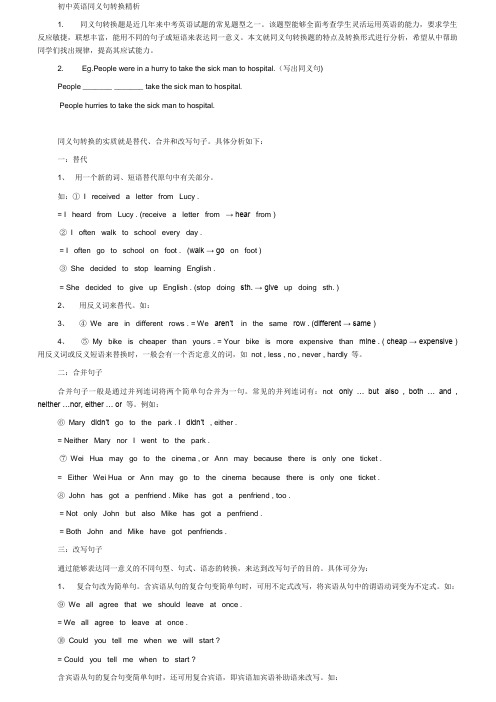
初中英语同义句转换精析1. 同义句转换题是近几年来中考英语试题的常见题型之一。
该题型能够全面考查学生灵活运用英语的能力,要求学生反应敏捷,联想丰富,能用不同的句子或短语来表达同一意义。
本文就同义句转换题的特点及转换形式进行分析,希望从中帮助同学们找出规律,提高其应试能力。
2. Eg.People were in a hurry to take the sick man to hospital.(写出同义句)People _______ _______ take the sick man to hospital.People hurries to take the sick man to hospital.同义句转换的实质就是替代、合并和改写句子。
具体分析如下:一:替代1、用一个新的词、短语替代原句中有关部分。
如:①I received a letter from Lucy .= I heard from Lucy . (receive a letter from → hear from )②I often walk to school every day .= I often go to school on foot . (walk → go on foot )③She decided to stop learning English .= She decided to give up English . (stop doing sth. → give up doing sth. )2、用反义词来替代。
如:3、④We are in different rows . = We aren’t in the same row . (different → same )4、⑤My bike is cheaper than yours . = Your bike is more expensive than mine . ( cheap → expensive ) 用反义词或反义短语来替换时,一般会有一个否定意义的词,如not , less , no , never , hardly 等。
初三句型转换(同义句转换)

初三句型转换(同义句转换)同义句转换同义句转换就是将所给的句⼦换个说法。
这⼀题型包含的内容多,形式杂。
有词汇的同义转换,句型的同义转换,等。
掌握该题型的解题技巧,可以很好地帮助学⽣理解、掌握所学的词汇和句型的含义,并在此基础上加以活⽤,对学⽣形成语⾔综合运⽤能⼒有极⼤的帮助。
要掌握该题型的正确的解题⽅法,需要在⽇常的英语学习中不断练习、归纳、积累。
⼀般说来,同义句转换主要有以下⼏种形式:1、词汇的同义转换词汇的同义转换主要有同义词、近义词的转换,反义词的转换,和同⼀个词在不同的句式中的不同的语序的转换等。
eg. (1) I spent 50 yuan on the coat .→I paid 50 yuan for the coat . (同义词的转换)(2) He likes playing football too .→He also likes playing football . (近义词的转换)(3) Millie sits behind Daniel .→Daniel sits in front of Millie . (反义词的转换)(4) They are all from America .→All of them are from America . (词序的转换)2、句型的同义转换常见的句型的同义转换主要有以下⼏种形式:简单句和简单句的互换,简单句和祈使句的互换,复合句和简单句的互换,复合句和复合句的互换等。
eg. (1) My favourite lesson is English .→I like English best. (简单句和简单句的互换)(2) It's lunchtime .→It's time for lunch . / It's time to have lunch . (同上)(3) Let's go boating .→Shall we go boating ?→Why not go boating ?→What about going boating ? (同上)(4)I spend about half an hour reading English in the morning .→It takes me about half an hour to read English in the morning . (同上)(5) He is too young to go to school .→He isn't old enough to go to school . (同上)→He is so young that he can't go to school . (简单句和复合句的互换)(6) You can't play basketball in the street .→Don't play basketball in the street . (简单句和祈使句的互换)(7) She didn't go to the bookshop yesterday , she went to the library instead .→She went to the library yesterday instead of the bookshop .(复合句和简单句的互换)(8) I went to bed after my mother came back last night .→I didn't go to bed until my mother came back last night .(复合句和复合句的互换)保持句意不变⼀,简单句与复合句的转换(保持句意不变,合并成⼀句)1. Creating a comic strip is difficult.It’s difficult _______ _______ a comic strip.2. We learn new words with pictures. We can remember them easily.We learn new words with pictures_______ ________we can remember them easily.3. We buy a special program in order to help the computer recognize our voice.We buy a special program ________ ________ it can help the computer recognize our voice.4. Detective Ken spent a week dealing with the case.Detective Ken a week to deal with the case.5. A team of men spent a whole day moving the ancient building._________ _________ a team of men a whole day to move the ancient building.6. Sally spent about 625 dollars on the iphone4 last Friday.Sally ________ about 625 dollars _______ the iphone4 last Friday.7.Mr. Smith set out early for the airport so that he could catch his flight.Mr. Smith set out early for the airport _________ _________ to catch his flight.8. Detective Ken did a lot about the case in order to find out the truth.Detective Ken did a lot about the case ________ ________ he could find out the truth.9. We learn a language in order to communicate.We learn a language _________ _______ we can communicate.10. The hardworking man went home after he finished all the work that day.The hardworking man ________ go home ________ he finished all the work that day. ⼆,宾语从句的转换改为间接引语)1.. He asked: “ How can I get to the Bund?” (He asked___________ he __________ get to the Bund.合并为⼀句)2. Mrs. Lin asked me “Have you finished drawing the picture?” (Mrs. Lin asked me ________ I ________ finished drawing the picture.3. When will we take an English exam? We wanted to know. (改为宾语从句)We wanted to know we take an English exam.(改为宾语从句)4. “Can you help me repair the bike?” Mary asked Jack.Mary asked Jack _____________he _____________ help her repair the bike.5. “Do you always catch such an early train?” The policeman asked the man.(合并为⼀句)The policeman asked the man ________ he always ________ such an early train.6. Frank asked me, "Have you ever created a comic strip?" (改为宾语从句)Frank asked me whether ________ ________ ever created a comic strip.7. “Mum, was the telephone invented by Bell?” the girl asked. (改为宾语从句) The girl asked her mum ________ the telephone ________ invented by Bell.8. I wondered. Will Jack recognize me after such a long time? (合并两句)I wondered ________ Jack ________ recognize me after such a long time.9. When are we going to visit the museum? Do you know? (改为宾语从句)Do you know when _______ _______ going to visit the museum?the driver.(合并为⼀句)10. “Is it the last bus to the city centre?” I askedI asked the driver ________ it ________ the last bus to the city centre.the sales manager wanted to11. “Are there any new products for the European market?” know.The sales manager wanted to know _________ there ________ any new products for the European market.12. Could you tell me? How can I deal with all these problems?Could you tell me how _______ _______ deal with all these problems13. “Does anyone need my help with the school project?” The class teacher asked.The class teacher asked ________ anyone ________ his help with the school project.三,条件状语从句内部以及与祈使句的转换1. Be quick, or you can’t catch the bus.you quick, you can’t catch the bus.2. We will have a barbecue in th e forest park if it doesn’t rain this Sunday.We will have a barbecue in the forest park __________ it __________ this Sunday.3. I prefer to sleep with the window wide open unless it’s really cold.I prefer to sleep with the window wide open ________ it ________ really cold.四,其他1. The water is warm. The baby can take a bath in it. (两句合并为⼀句简单句)The water is ____________ ____________ for the baby to take a bath in.2. Our monitor is too weak to play football any more. (保持原句意思)Our monitor is not ________ ________ to play football any more.保持句意基本不变)3. The box on the shelf is so heavy that the boy can’t carry it. (The box on the shelf isn’t _____________ _____________ for the boy to carry.4. The Korean pop music video Gangnam Style is very popular. Many people would like tolearn the funny dance.The Korean pop music video Gangnam Style is ________ popular ________ many peoplewould like to learn the funny dance.5. This shelf is too small to hold all your books.(保持句意基本不变)This shelf is small it can’t hold all your books.6. I was so lucky that I was in the right place at the right time. (保持句意基本不变)I was ________ _______ to be in the right place at the right time.sked me another question.7 The teacher didn’t answer my question. He aThe teacher asked me another question ________ of ________ my question.8. Lucy has been to Beijing. Mark has been to Beijing as well.____________Lucy and Mark ____________been to Beijing.9. We can go to the museum by bus. We can go there by underground instead.We can go to the museum _________ by bus _________ by underground.10. We cannot drink sea water. We cannot take a shower with it, either. We can ________ drink sea water ________ take a shower with it.11. George didn’t do his homework. He watched TV news.George watched TV news ________ ________ doing his homework.12. Sam didn’t go with his classmates for the party. He went to see a film alone.Sam went to see a film alone _________ __________ going with his classmates for the party.13. I was the only person who was invited to the party.Nobody ___________ me ____________ invited to the party.14. Yesterday my friend Charlie said sorry to me because he broke my glasses.Yesterday my friend Charlie ________ to me ________ breaking my glasses.15. What would you like to ask besides this question?What would you like to ask _______ ________ to this question?16. The 30th Olympic Games were held in London in 2012.The 30th Olympic Games ________ ________ in London in 2012.17. Remember to say sorry to others if you do something wrong.Remember to ________ ________ others if you do something wrong.18. My daughter studies both singing and dancing in the kindergarten.My daughter studies singing ________ ________ as dancing in the kindergarten.19. Amy looks after the pets when her parents are away from home.Amy the pets when her parents are away from home.20. We cannot predict the exact time and location of earthquake now.________ ________, we cannot predict the exact time and location of earthquake. .21.To do this job well, you need time, and you also need brains.To do this job well, you need time and brains _________ __________.22. Sitting up too late at night is harmful to our health.Sitting up too late at night is ________ ________ our health.23. Why didn’t you tell him the truth when he asked you about his illness?________ ________ tell him the truth when he asked you about his illness?。
聚焦中考同义句转换十二类型(资料型)--可打印
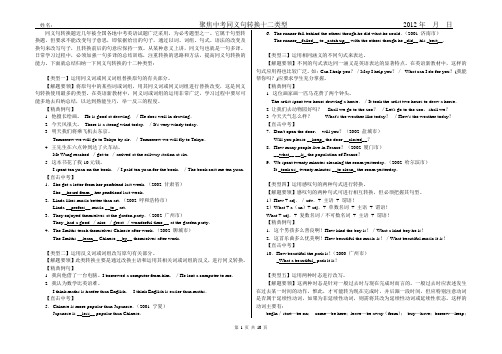
同义句转换题近几年被全国各地中考英语试题广泛采用,为必考题型之一。
它属于句型转换题,但要求不能改变句子意思,即依据给出的句子,通过以词、词组、句式、语法的改变及换句来改写句子,且转换前后的句意应保持一致。
从某种意义上讲,同义句也就是一句多译。
日常学习过程中,必须加强一句多译的总结训练,注重转换的思路和方法,提高同义句转换的能力。
下面就总结归纳一下同义句转换的十二种类型:【类型一】运用同义词或同义词组替换原句的有关部分。
【解题要领】将原句中的某些词或词组,用其同义词或同义词组进行替换改变,这是同义句转换使用最多的类型。
在英语新教材中,同义词或词组的运用非常广泛,学习过程中要尽可能多地去归纳总结,以达到熟能生巧,举一反三的程度。
【精典例句】1. 他擅长绘画。
He is good at drawing./He does well in drawing.2. 今天风很大。
There is a strong wind today./It's very windy today.3. 明天我们将乘飞机去东京。
Tomorrow we will go to Tokyo by air./Tomorrow we will fly to Tokyo.4. 王先生在六点钟到达了火车站。
Mr Wang reached /got to /arrived at the railway station at six.5. 这本书花了我10元钱。
I spent ten yuan on the book./I paid ten yuan for the book./The book cost me ten yuan.【直击中考】1.She got a letter from her penfriend last week.(2002 甘肃省)She __heard from _ her penfriend last week.2.Linda likes music better than art.(2002 呼和浩特市)Linda __prefers__ music __to _ art.3.They enjoyed themselves at the garden party.(2002 广州市)They _had a good /nice /great /wonderful time __ at the garden party.4.The Smiths teach themselves Chinese after work.(2002 聊城市)The Smiths __learn__ Chinese __by__ themselves after work.【类型二】运用反义词或词组改写原句有关部分。
初中英语同义句转换的九种类型

初中英语同义句转换的九种类型同义句转换题是近几年中考英语的一个常考题型,其出题形式通常是同时给出两个句子,第一句完整,第二句中设有几处空格,要求考生填入适当的词或词组,使第二句的意思与第一句意思相同。
它综合考查考生的语法、词汇、短语或习惯用语和句型结构等知识,要求运用所学的词汇、语法知识和句型结构填写句子,使句子结构完整、逻辑合理、语法知识无误、意思与所给句子相同。
通过对近几年的中考英语试题中同义句转换题的分析,我们发现中考英语同义句转换题主要考查以下几个方面:一、运用同义词(组)进行转换用同义词或同义词组对原句中的某些词或词组进行替换,注意转换后的词或词组的词形变化要与句子其他成分相适应。
如:1. That day we could see flowers here and there. That day we couldsee flowers __________.分析:答案为everywhere。
everywhere与here and there都表示“到处”。
2. The teacher always takes good care of the children in the school. The teacher always_______ ______the children well in the school.分析:答案为looks after。
take good care of与look after…well都表示“好好照顾”。
二、运用反义词(组)的否定式进行转换即用反义词或词组的否定式表达与原句相同的意思,主要考查学生对反义词(词组)的积累和换位思维的能力。
如: 1. It’s clear that this visit is differ ent from last time. It’s clear that this visit is not the___ ___last time.分析:答案为same as。
同义句转换十二类型解析及练习
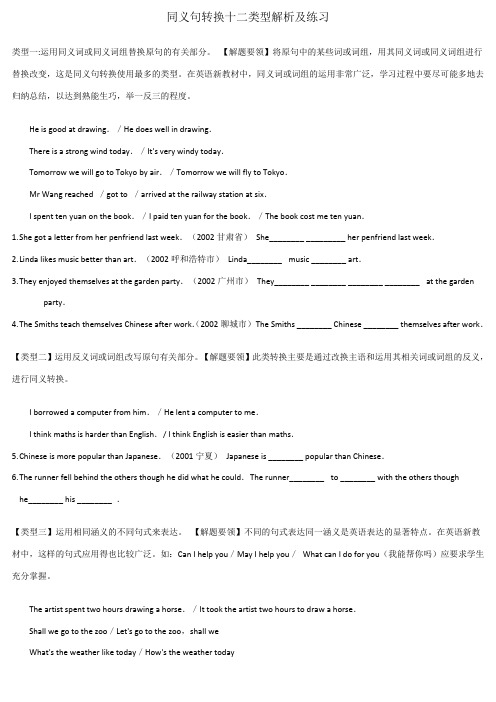
同义句转换十二类型解析及练习类型一:运用同义词或同义词组替换原句的有关部分。
【解题要领】将原句中的某些词或词组,用其同义词或同义词组进行替换改变,这是同义句转换使用最多的类型。
在英语新教材中,同义词或词组的运用非常广泛,学习过程中要尽可能多地去归纳总结,以达到熟能生巧,举一反三的程度。
He is good at drawing./He does well in drawing.There is a strong wind today./It's very windy today.Tomorrow we will go to Tokyo by air./Tomorrow we will fly to Tokyo.Mr Wang reached /got to /arrived at the railway station at six.I spent ten yuan on the book./I paid ten yuan for the book./The book cost me ten yuan.1.She got a letter from her penfriend last week.(2002甘肃省)She________ _________ her penfriend last week.2.Linda likes music better than art.(2002呼和浩特市)Linda________ music ________ art.3.They enjoyed themselves at the garden party.(2002广州市)They________ ________ ________ ________ at the gardenparty.4.The Smiths teach themselves Chinese after work.(2002聊城市)The Smiths ________ Chinese ________ themselves after work.【类型二】运用反义词或词组改写原句有关部分。
英语同义句转换

英语同义句转换同义句转换就是指改写后,两个句子的意思一样。
1、运用同义词(组)进行转换用同义词或同义词组对原句中的某些词或词组进行替换,注意转换后的词或词组的词形变化要与句子其他成分相适应。
2、运用反义词(组)的否定式进行转换即用反义词或词组的否定式表达与原句相同的意思,主要考查学生对反义词(词组)的积累和换位思维的能力。
3、运用不同语态进行转换即运用主动语态与被动语态的变化来转换同义词,但此时要特别注意时态、动词一致性。
4、非延续性动词与延续性动词的相互转换即非延续性动词与延续性动词进行转换,此时往往会涉及时态的变化。
5、运用不同引语进行转换即将直接引语变为间接引语或将间接引语转换成直接引语。
此时还要注意相关时态、人称、动词、状语等相应的变化。
6、简单句与复合句之间的转换即将简单句变成同义的复合句或将复合句变成同义的简单句。
7、并列句与复合句之间的转换即将并列句变成同义的复合句或将复合句变成同义的并列句。
8、运用关联连词连接或合并句子即运用关联连词both…and…,neither…nor…,either…or…,not only…but also…等将两个简单句合并为一个简单句。
此时要注意的是,both…and…连接两个主语时,谓语总是用复数。
而neither…nor…,either…or…,not only…but also…连接两个主语时,谓语动词通常应与靠近的主语保持一致。
9、运用某些典型句式或结构进行转换这类典型结构如so…that…,too…to…,enough to,not…until…,so do I 等。
扩展资料同义句转换题是近几年中考及初中三年期间英语的一个常考题型,其出题形式通常是同时给出两个句子,第一句完整,第二句中设有几处空格,要求填入适当的词或词组,使第二句的意思与第一句意思相同。
它综合考查学生的语法、词汇、短语或习惯用语和句型结构等知识,要求运用所学的词汇、语法知识和句型结构填写句子,使句子结构完整、逻辑合理、语法知识无误、意思与所给句子相同。
中考英语同义词转换“十二类型”知识精讲

中考英语同义词转换“十二类型”知识精讲同义句转换题近几年被全国各地中考英语试题广泛采用,为必考题型之一。
它属于句型转换题,但要求不能改变句子意思,即依据给出的句子,通过以词、词组、句式、语法的改变及换句来改写句子,且转换前后的句意应保持一致。
从某种意义上讲,同义句也就是一句多译。
日常学习过程中,必须加强一句多译的总结训练,注重转换的思路和方法,提高同义句转换的能力。
下面就总结归纳一下同义句转换的十二种类型:【类型一】运用同义词或同义词组替换原句的有关部分。
【解题要领】将原句中的某些词或词组,用其同义词或同义词组进行替换改变,这是同义句转换使用最多的类型。
在英语新教材中,同义词或词组的运用非常广泛,学习过程中要尽可能多地去归纳总结,以达到熟能生巧,举一反三的程度。
【经典例句】1、他擅长绘画。
He is good at drawing./He does well in drawing.2、今天风很大。
There is a strong wind today./It's very windy today.3、明天我们将乘飞机去东京。
Tomorrow we will go to Tokyo by air./Tomorrow we will fly to Tokyo.4、王先生在六点钟到达了火车站。
Mr Wang reached /got to /arrived at the railway station at six.5、这本书花了我10元钱。
I spent ten yuan on the book./I paid ten yuan for the book./The book cost me ten yuan.【直击中考】1.She got a letter from her penfriend last week.(2002某某省)She________ _________ her penfriend last week.2.Linda likes music better than art.(2002呼和浩特市)Linda________music ________ art.3.They enjoyed themselves at the garden party.(2002某某市)They________ ________ ________ ________at the garden party.4.The Smiths teach themselves Chinese after work.(2002聊城市)The Smiths ________ Chinese ________ themselves after work.【类型二】运用反义词或词组改写原句有关部分。
中考同义句转换方法透析及相关练习

中考同义句转换方法透析及相关练习总所周知,语言是思想、情感交流的载体。
相同的意思有时可以用不同的方式表达。
了解并学会多种表达法,能更好地适应交际的需要。
同义句转换也是中考常考题型。
此类题型考生失分较大。
现归纳以下解题方法与思路。
一、运用同义词或同义词组e.g. 1. I got a letter from my brother last weekend.= I heard from my brother last weekend.2.His little sister could dress herself when she was three years old.= His little sister was able to dress herself at the age of three.这类题目首先要注意比较上下两句,找出需要改动的地方,运用同义词或同义词组进行转换。
还要注意把握两句的时态、数的单复和主谓一致等。
Exercises:1.A.The children are having a good time in the park now.B. The children are__________ ____________ in the park _________ _________ ___________.2.A.He spent thirty minutes in finishing his homework. My God.B._____ _________ him ________ _________ _________ ________ finish his homework.3.A.Very soon the baby started crying.B. In ________ ___________ the baby _________ ________ cry.4.A.What do you think of the movie you saw last week?B.___________ do you __________ the movie you saw last week?5.A.There is only an old chair in the room.B. There's _________ __________ an old chair in the room.6.A.What's the matter with you, young man?B. What's _________ with you, young man?7.A.Did you have any problems in working out the math problem?B. Did you have ______________ in _____________ the math problem?8.A.He'll come to my birthday soon after he finishes his project.B. He'll come to my birthday __________ __________ ________ his project is finished.二、运用反义词或反义词组e.g. 1.She failed the English exam last time.= She didn't pass the English exam last time.2.His house is near the school.= His house isn't far from the school.= His house is close to the school.这类题目可以否定句中的动词或形容词,是两句意思相符。
同义句转换精析

同义句转换精析同义句转换题是近几年来中考英语试题的常见题型之一。
该题型能够全面考查学生灵活运用英语的能力,要求学生反应敏捷,联想丰富,能用不同的句子或短语来表达同一意义。
本文就同义句转换题的特点及转换形式进行分析,希望从中帮助同学们找出规律,提高其应试能力。
同义句转换的实质就是替代、合并和改写句子。
具体分析如下:一:替代1、用一个新的词、短语替代原句中有关部分。
如:① I received a letter from Lucy .= I heard from Lucy . (receive a letter from → hear from ) ②I often walk to school every day . = I often go to school on foot. (walk → go on foot ) ③She decided to stop learning English . = She decided to give up English . (stop doing sth. → give up doing sth. )2、用反义词来替代。
如:④We are in different rows . = We aren’t in thesame row . (different → same ) ⑤My bike is cheaper than yours . = Your bike is more expensive than mine . ( cheap → expensive ) 用反义词或反义短语来替换时,一般会有一个否定意义的词,如not , less , no , never , hardly 等。
二:合并句子合并句子一般是通过并列连词将两个简单句合并为一句。
常见的并列连词有:not only … but al so , both … and , neither …nor, either … or 等。
常见同义句转化九大句型
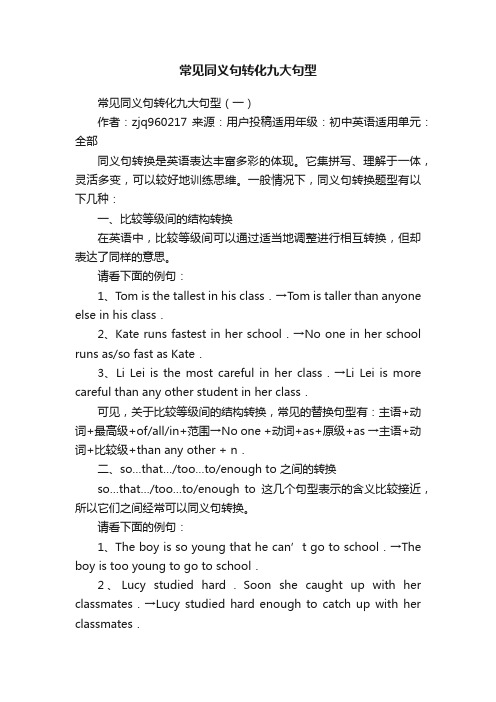
常见同义句转化九大句型常见同义句转化九大句型(一)作者:zjq960217 来源:用户投稿适用年级:初中英语适用单元:全部同义句转换是英语表达丰富多彩的体现。
它集拼写、理解于一体,灵活多变,可以较好地训练思维。
一般情况下,同义句转换题型有以下几种:一、比较等级间的结构转换在英语中,比较等级间可以通过适当地调整进行相互转换,但却表达了同样的意思。
请看下面的例句:1、Tom is the tallest in his class.→T om is taller than anyone else in his class.2、Kate runs fastest in her school.→No one in her school runs as/so fast as Kate.3、Li Lei is the most careful in her class.→Li Lei is more careful than any other student in her class.可见,关于比较等级间的结构转换,常见的替换句型有:主语+动词+最高级+of/all/in+范围→No one +动词+as+原级+as →主语+动词+比较级+than any other + n.二、so…that…/too…to/enough to 之间的转换so…that…/too…to/enough to这几个句型表示的含义比较接近,所以它们之间经常可以同义句转换。
请看下面的例句:1、The boy is so young that he can’t go t o school.→The boy is too young to go to school.2、Lucy studied hard.Soon she caught up with her classmates.→Lucy studied hard enough to catch up with her classmates.3、He isn’t tall enough to reach the apple on the table.→He is too short to reach the apple on the table.可见,关于so…that…/too…to/enough to 之间的转换,常见的替换句型有:so…that 否定从句→too…to…/not(原形容词的)反义词+enough to三、主句+after从句→not…until主句+after从句和not…until句型表示的含义也比较接近,两者之间也经常可以同义句转换。
高考英语同义句转换

高考英语同义句转换句子转换是高考英语中的重要题型之一,要求考生根据句子给出的提示信息,变换句子结构,保持句意不变。
以下是一些常见的句子转换类型及其例子。
1. 否定句转换:句型:主语 + 动词 + 其他转换:主语 + 助动词(do/does/did)+ not + 动词 + 其他例句:He can speak English. -> He cannot speak English.2. 一般疑问句转换为否定句:句型:助动词(do/does/did)+ 主语 + 动词 + 其他?转换:助动词(do/does/did)+ 主语 + not + 动词 + 其他例句:Did you finish your homework? -> Did you not finish your homework?3. 否定疑问句转换为陈述句:句型:助动词(do/does/did)+ 主语 + not + 动词 + 其他?转换:主语 + 助动词(do/does/did)+ 动词 + 其他例句:Didn't he go to the party? -> He didn't go to the party.4. 原因状语从句转换为原因状语介词短语:句型:因果关系连词 + 主语 + 谓语 + 其他转换:介词 + 名词 + 主语 + 谓语 + 其他例句:As she was tired, she went to bed early. -> Because of tiredness, she went to bed early.5. 直接引语转换为间接引语:句型:直接引语转换:间接引语例句:She said, "I am going to the park." -> She said that she was going to the park.6. 感叹句转换为陈述句:句型:How + 形容词/副词 + 主语 + 谓语转换:主语 + 谓语例句:How beautiful the flowers are! -> The flowers are beautiful.以上是一些常见的高考英语同义句转换类型及其例子。
中考考点专题归纳28--同义句转换

中考考点专题归纳—同义句转换一热点分析:同义句转换历来是中考的热点和难点,也是学生们最容易出错的题目.现总结以下规律帮助其轻松解答.二同义句转换的种类:⑴:上下对齐式: 这类同义句转换相对简单主要考查:同义词/同义词组之间的转换.如:1.be good at = do well in (此短语的难题是与比较级相结合)2.have a good time = enjoy oneself = have fun3.such +a/ an + adj + N = so +adj + a / an (此结构只有名词为单数可数名词时成立)4.at the age of + 数词= when sb was +数词5.shall we + V = why not + V = why don’t you + V = what / how about + Ving6.To v … = It is adj (for sb / of sb ) to do sth7.look like = look the same = take after8.Don’t worry = don’t be worried9.not any more = no more10.not any longer = no longer11.help sb with = help sb to do / do sth12.like ving sth better than ving sth = prefer ving sth to ving sth13.like + 学科/ 项目best = 学科/ 项目is one’s favorite subject/ sports.14.sb found / saw sb ving = sb found / saw that + 主+ link verb + ving15.anything else = other things⑵:同义句式间的转换中考这类题目考查的比较多而且常以经典同义句转换居多,故下面特总结经典同义句转换。
“同义句转换”解题技巧及例析
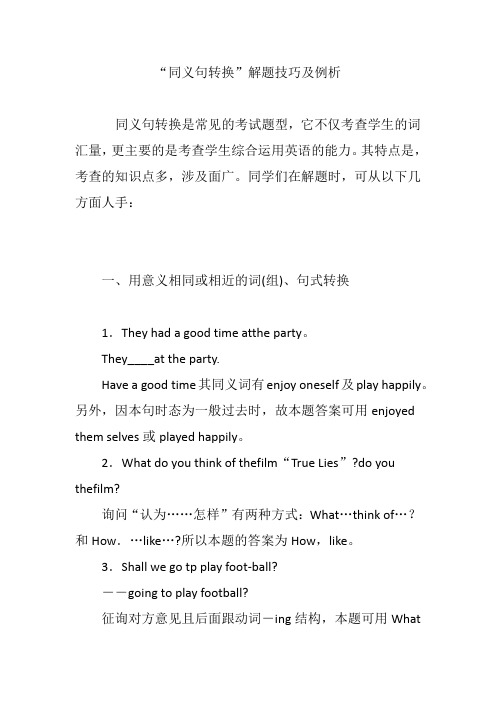
“同义句转换”解题技巧及例析同义句转换是常见的考试题型,它不仅考查学生的词汇量,更主要的是考查学生综合运用英语的能力。
其特点是,考查的知识点多,涉及面广。
同学们在解题时,可从以下几方面人手:一、用意义相同或相近的词(组)、句式转换1.They had a good time atthe party。
They____at the party.Have a good time其同义词有enjoy oneself及play happily。
另外,因本句时态为一般过去时,故本题答案可用enjoyed them selves或played happily。
2.What do you think of thefilm“True Lies”?do you thefilm?询问“认为……怎样”有两种方式:What…think of…?和How.…like…?所以本题的答案为How,like。
3.Shall we go tp play foot-ball?――going to play football?征询对方意见且后面跟动词―ing结构,本题可用Whatabout或How about。
4.Why don't you go homeat once?――go home at once?Why don't you…?等于Whynot…?故本题应填Why not。
二、用意义相反的词(组)、句式转换1.She's shorter than I.She's____as____as I.此题须用not as(so)…as…句型,所填形容词须与原句词义相反,即填not…tall.2.I think art is less importantthan maths.I think art is____importantthan maths.此题须填意义恰好相反的don't和more两个词。
聚焦中考同义句转换十二类型
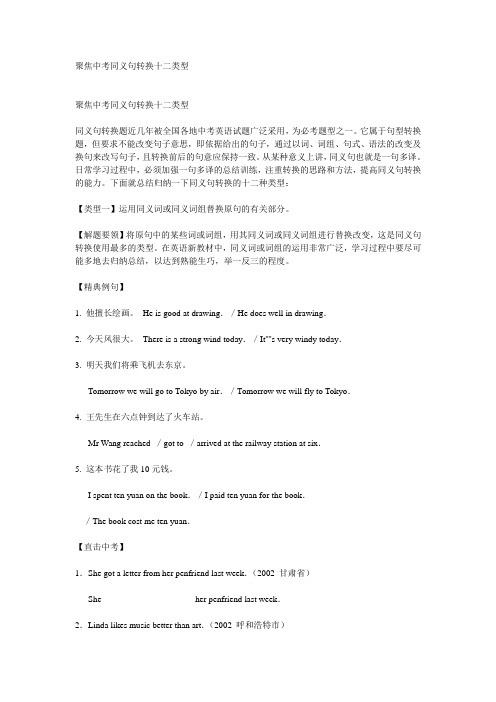
聚焦中考同义句转换十二类型聚焦中考同义句转换十二类型同义句转换题近几年被全国各地中考英语试题广泛采用,为必考题型之一。
它属于句型转换题,但要求不能改变句子意思,即依据给出的句子,通过以词、词组、句式、语法的改变及换句来改写句子,且转换前后的句意应保持一致。
从某种意义上讲,同义句也就是一句多译。
日常学习过程中,必须加强一句多译的总结训练,注重转换的思路和方法,提高同义句转换的能力。
下面就总结归纳一下同义句转换的十二种类型:【类型一】运用同义词或同义词组替换原句的有关部分。
【解题要领】将原句中的某些词或词组,用其同义词或同义词组进行替换改变,这是同义句转换使用最多的类型。
在英语新教材中,同义词或词组的运用非常广泛,学习过程中要尽可能多地去归纳总结,以达到熟能生巧,举一反三的程度。
【精典例句】1. 他擅长绘画。
He is good at drawing./He does well in drawing.2. 今天风很大。
There is a strong wind today./It''''s very windy today.3. 明天我们将乘飞机去东京。
Tomorrow we will go to Tokyo by air./Tomorrow we will fly to Tokyo.4. 王先生在六点钟到达了火车站。
Mr Wang reached /got to /arrived at the railway station at six.5. 这本书花了我10元钱。
I spent ten yuan on the book./I paid ten yuan for the book./The book cost me ten yuan.【直击中考】1.She got a letter from her penfriend last week.(2002 甘肃省)She __________ __________ her penfriend last week.2.Linda likes music better than art.(2002 呼和浩特市)Linda __________ music ___________ art.3.They enjoyed themselves at the garden party.(2002 广州市)They _________ _________ __________ _________ at the garden party.4.The Smiths teach themselves Chinese after work.(2002 聊城市)The Smiths ___________ Chinese ___________ themselves after work.【类型二】运用反义词或词组改写原句有关部分。
如何做好同义句转换题

如何做好同义句转换题作者:陈裕明所谓同义句转换就是将一个句子用另一种形式表达出来,而且意思不变。
因此,掌握的句型越多,做题就越方便、快捷、容易。
但每种练习的方式总有一定的规律可循,这里我们就来进行归纳,试着从最常见的变化形式中找出一些规律来。
1. 用具有相同意思的词或词组进行转换。
如:(1) She had a good time in Wuhan.→She enjoyed herself in Wuhan.(2) He spends some money on books every week.→He pays some money to buy books every week. / Books cost him some money every week.2. 借助于反义词或反义词组进行转换。
如:(1) I can't run as fast as my brother.→I run more slowly than my brother. / My brother runs faster than I.(2) He is not old enough to go to school.→He is too young to go to school.3. 词语的理解和运用这里是指:由于词性不同,但所表达的意思相同的句型变换。
如:We often go to school on foot.→We often walk to school.小结:既然是同义句转换,首先要在意思不变的情况下进行正确的转换:1. 注意词类的变化使用,如名词、动词、形容词的相互转换;2. 短语的使用要注意正确的表达方式和同义短语的确定;3. 同义句型的使用及转换要在平时注意积累、归纳和运用。
人教版英语同义句句型转换附练习及问题详解

英语句型转换(一).同义句转换知识点讲解(14种类型)一、运用同义词(组)进行转换用同义词或同义词组对原句中的某些词或词组进行替换(又称“词语替代法”),注意转换后的词或词组的词形变化要与句子其他成分相适应。
如:1. That day we could see flowers here and there.That day we could see flowers __________.分析:答案为everywhere。
everywhere与here and there都表示“到处”。
2. The teacher always takes good care of the children in the school.The teacher always_______ ______the children well in the school.分析:答案为looks after。
take good care of与look after…well都表示“好好照顾”。
3. The children are wearing beautiful clothes.The children are_________beautiful clothes.4. Every day,Yao Ming receives E-mails from thousands of basketball fans.Every day,Yao Ming_________thousands of basketball fans.5. Mr. Smith is working.Mr. Smith is__________ __________.答案:1. in 2. hears from 3. at work二、运用反义词(组)的否定式进行转换即用反义词或词组的否定式表达与原句相同的意思,主要考查学生对反义词(词组)的积累和换位思维的能力。
- 1、下载文档前请自行甄别文档内容的完整性,平台不提供额外的编辑、内容补充、找答案等附加服务。
- 2、"仅部分预览"的文档,不可在线预览部分如存在完整性等问题,可反馈申请退款(可完整预览的文档不适用该条件!)。
- 3、如文档侵犯您的权益,请联系客服反馈,我们会尽快为您处理(人工客服工作时间:9:00-18:30)。
即运 用 主动语 态 与被 动语 态 的 变化来 转 换 同义 句 。但 此 时要 特 别注
意 时态 的一 致 性。 如 :
1.Everyone should give back his library books on tim e.
Library books should
on tim e.
或词组进行转换 .注意转换后 的词或词组 的词 形 变化 要与句 子 的其他 成 分相 适应 。如 :
1.That day we could see flowers here
and there.
That day we could see flowers
.
—
—
分析 :答 案 为 everywhere。everywhere与
同义 句 转 换 题 是 近 几 年来 中 考 英 语 试 题
鍪 兰 堡●
Inf ^“/辅 是 站
的常见题型之一。本 文就近几年中考英语试题 中同义 句 转换 题 的特 点及 转 换 形 式进 行 分 析 。
希望能帮助同学们找出规律 。提高应试能力。
一 、 运用 同义 词 (组 )进行 转换 用 同义 词 或 同义 词 组 对 原 句 中的 某 些 词
.. . .. . .. . .. . — .
分析 :答 案为 on for。 has been提示时态是现在完成 时态 ,“for+时
间段 ”表示 “持 续 (一段 时 间 )”,常用在 含 有现 在完 成 时态 的句 子里 。
3.Mr Li joined the party twenty years ago.
1
think wealth is— — im portant than health.
—
—
分 析 :答 案 为 don’t,more。 less important的 意 思是 “没 有 (不 及 )
… … 重 要 ”:more important的意 思 是 “(比 )… …更 重 要 ”,该 结 构 与 not
相 同 的意 思 。主要 考查 学 生 对 反义 词 (词 组 )的
积累和换位思维 的能力。如 :
1.It’S clear that this visit is d ifferent fr0m
last tim e.
It’S clear that this visit is not the
—
—
last tim e.
固—一
_鍪塑皇翌堡
辅 曷 站 , I n^£Jz“^N
分析 :答案为 same as。be diferent from意 为 “与……不同”;the
same as意 为 “与 ……相 同”,其 否定 式 与 be different from 同义 。
2.I think wealth is less im portant than health.
two hours这样 的一 段 时 间连 用 ,而 改成 be away这 样 的 延续 动 词 后 ,则
可 与一段 时 间连 用 。
2.The film began five m inutes ago.
The film has been
five m inutes.
. . .. . .. . . .. . — —
. Байду номын сангаас. . .. . .. . . .— —
. .. 。 .. . .. . .. — —
. . .. . .. . .. . — —
分析 :答案为 be given back。被动句 中含有情态动词 should,因此
助 动词 用 be。
2.It is w idely accepted that m ore people use com puters in the
连 用 .则 表 示 “不 比…… 更重 要 ”。 另外 。有 的反义词 即使 不与 否定 词连 用 ,而 只需 改 变句 子 结 构也 可构
成 同义 句 。如 :
He lent some money to his friend.
Hisfriend
som e m oney— — him .
.. .. .. .. ... . .— —
the
同义句转 换的九种 题型分析 children well in the schoo1. 分 析 :答 案 为 looks afterotake good care
0f与 look after…well都 表示 “好 好照 顾 ”。
= 、运用 反义 调 (组 )的否 定式 进 行转 换 即 用反 义 词 或 词 组 的 否 定 式 表 达 与 原 句
—
—
分 析 :答 案 为 borrowed,from。 borrow …from 意 为 :“向……借
…
…
” lend…to意为“把……借给 …..,’。两个结构意思相反 ,但若 变换
。
“借 出者 ”与 “借人 者 ”的位 置 则可 转换 为 同义 句 。
三 、运用 不 同语态 进 行转 换
here and there都 是表 示 “到 处 ”
山
东
李 晓 梦
2.The teacher always takes good care
of the children in the schoo1.
The"teacher always .. .. .. ... .. .. .— —
world today.
Com puters
widely
—
—
in the world today.
分析 :答案为 are,used。computers是复数名词 ,系动词用 are。
四、非延续性动词与延续性动词的相互转换
即非延续性动词与延续性动词进行转换 .此 时往往会涉及 时态的变
—
—
—
匆
化 。如 :
鍪塑 翌堡_
^f1z}1A ,辅 粤 站
1.The manager left two hours ago.
The m anager............—.............——............——for two hours.
分析 :答案为 has been away。leave为非延续性动词 ,不能与 for
